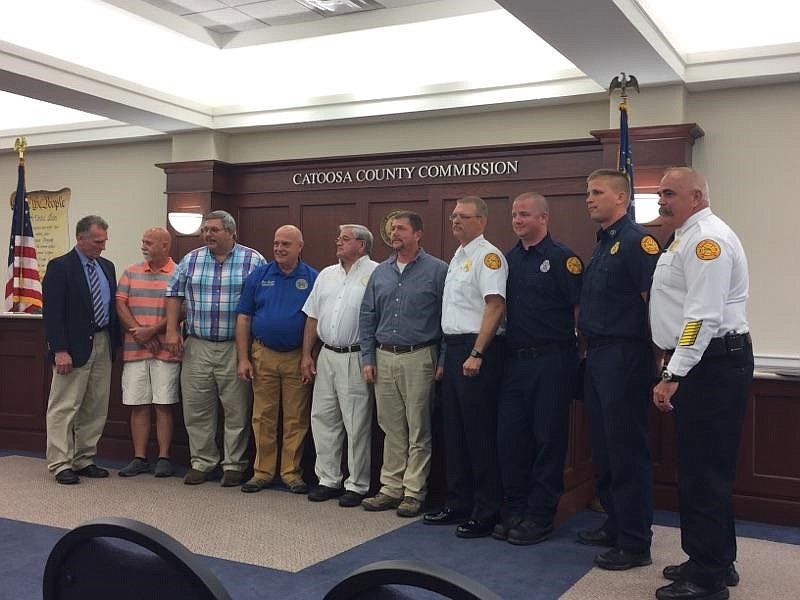The last thing Catoosa County Schools employee Charlie Ramsey remembers was feeling faint while chatting with some co-workers and his boss at the CCS Bus Depot. The next thing he knew, he was on a stretcher with an oxygen mask being placed over his mouth by an EMT.
In the interim between the two memories, Ramsey suffered a cardiac arrest. Through the quick actions of his co-workers and the swift response from the Catoosa County Fire Department, Ramsey is alive and well, now with a brand-new pacemaker.
Ramsey had heart surgeries previously, but the last one was in 2011. He'd felt no strain or had any reason for concern that afternoon, he said. His near-death experience struck without warning.
"The good Lord was looking after me, that's all I can say," Ramsey said.
Two of the bus depot's mechanics caught him before he fell off the stool he was sitting on when his heart stopped. When they reached for a pulse, they found none. His boss, CCS Transportation Manager Jerene Jones, instructed someone to call 911 while she and another mechanic alternated chest compressions and mouth-to-mouth.
Despite their best efforts, Ramsey started to turn blue.
"It was a very scary thing that here's this human being who one minute was breathing and laughing, and the next minute there's no signs of life," Jones said.
Another co-worker fetched an automated external defibrillator, or AED, and the group followed the machine's instructions. The AED gave three jolts to Ramsey's heart before it refused to give another. AEDs are designed to not deliver an electric shock unless it will be beneficial to the patient.
"That immediately told us he either had no heart activity whatsoever, or he had a heart rhythm, even if it was small," said Catoosa County Assistant Chief of Operations Steven Quinn, one of the first responders to arrive on the scene. Jones said responders arrived six minutes after the call was made, though it felt like an eternity.
Just before Quinn and Daniel Walston, Catoosa's assistant chief of training made it to the scene, Jones said she felt a weak breath from Ramsey on her cheek after performing mouth-to-mouth. After assessing what had happened, Quinn and Walston performed rescue breathing on Ramsey until he could be stabilized in an ambulance, given oxygen and taken to Memorial Hospital.
"I've run a lot of medical calls, many involving heart attacks or cardiac events," said Quinn, an 18-year veteran of the Catoosa Fire Department. "Usually, most of those outcomes are not positive in nature. The odds are against you."
Prior to this call, Quinn said he'd been involved in only three calls where a person's heart had stopped and they were saved afterwards. He credits the decisive action of Ramsey's co-workers for saving his life.
"They did all the hero stuff. They kept calm and cool and used their training," he said. "This was a team effort."
Emergency response is important to Jones, she said. It's why all of the school district's bus drivers and bus monitors have been trained in CPR and AED usage.
According to Ramsey, that building wasn't even initially meant to have an AED. They were supposed to go to every school building in the district, he said, which would total 20 units. However, the county had ordered 22, and thus the bus garage received one of the extras. The oversight likely saved his life.
"My opinion, every government building should have one and people trained to use it," Ramsey said. "That was a real devastating situation, when one of your co-workers is lying there dead and you're trying to bring them back."
"And they did it," he added.
Jones credits divine intervention with having the right people and equipment in the right place at that time. Any later in the day, she said, and Ramsey might have been driving home. Any earlier, and he might have been alone in his office.
"These are expensive machines, but I know you can't put a price tag on a human life," she said.
According to the American Heart Association, AEDs typically cost between $1,500 to $2,000.
"In my mind, they've already paid for themselves," said Jones.
